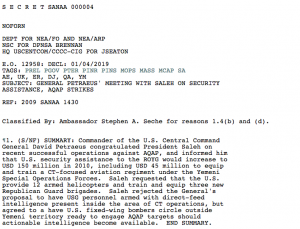Is the Government Going to Claim Bradley Manning “Harmed” the US by Exposing Drone Details?
Last week’s Bradley Manning hearing significantly focused on how much the government could hide about its witnesses. A big part of the discussion pertained to how a Seal Team 6 member would testify to finding WikiLeaks material at Osama bin Laden’s compound. But the government also advanced its case to have a list of other government employees testify, at least partly, in secret, mostly in the “harm” phase of sentencing.
Here’s Alexa O’Brien’s transcription of that list (click through for the list). There are a number of interesting names on this list. But the one that popped out at me is Ambassador Stephen Seche.
You see, while Seche was Chargé d’Affaires in Syria mid-decade and more recently was in charge of Near Eastern affairs at State, he will almost certainly testify about how WikiLeaks disclosures of cables he wrote while Ambassador to Yemen “harmed” relations with that country.
Indeed, as the image above shows, Seche wrote one of the most newsworthy cables ever released by WikiLeaks, the January 4, 2010 cable recounting a January 2 meeting between then CentCom head David Petraeus and Yemeni President Ali Abdullah Saleh.
The cable is best known for this statement, laying out the agreement by which Saleh would lie about missile and drone strikes and pretend they were Yemen’s.
“We’ll continue saying the bombs are ours, not yours,” Saleh said, prompting Deputy Prime Minister Alimi to joke that he had just “lied” by telling Parliament that the bombs in Arhab, Abyan, and Shebwa were American-made but deployed by the ROYG.
But there are several other inflammatory details in this cable. There’s the nugget of our agreement to shift from using cruise missiles to drones.
Saleh did not have any objection, however, to General Petraeus’ proposal to move away from the use of cruise missiles and instead have U.S. fixed-wing bombers circle outside Yemeni territory, “out of sight,” and engage AQAP targets when actionable intelligence became available.
Potentially more damning still, there’s the passage that suggests Anwar al-Awlaki was an intended target of the December 24, 2009 attack (a day before the US believed he was an operational and at least a month before it had evidence he was). In addition, there’s Petraeus’ absolutely incorrect contention that only three civilians had died at al-Majala instead of the Bedouin clan we know died.
(S/NF) Saleh praised the December 17 and 24 strikes against AQAP but said that “mistakes were made” in the killing of civilians in Abyan. The General responded that the only civilians killed were the wife and two children of an AQAP operative at the site, prompting Saleh to plunge into a lengthy and confusing aside with Deputy Prime Minister Alimi and Minister of Defense Ali regarding the number of terrorists versus civilians killed in the strike. (Comment: Saleh’s conversation on the civilian casualties suggests he has not been well briefed by his advisors on the strike in Abyan, a site that the ROYG has been unable to access to determine with any certainty the level of collateral damage. End Comment.) AQAP leader Nassr al-Wahishi and extremist cleric Anwar al-Awlaki may still be alive, Saleh said, but the December strikes had already caused al-Qaeda operatives to turn themselves in to authorities and residents in affected areas to deny refuge to al-Qaeda. [my emphasis]
At the very least, this passage demonstrates how shoddy our intelligence was both before and after we killed a bunch of civilians. But it may also support the case that the first time we tried to kill Awlaki, we didn’t believe he met the standards laid out in the memo that would ultimately authorize his killing: being a senior operational leader of AQAP involved in planning attacks against the US.
In other words, this cable, by itself, may include evidence of possible war and domestic crimes.
And yet the government wants to send Seche to a classified hearing to talk about the “harm” Bradley Manning caused.
While I think it possible that release of this particular cable made it harder for Djibouti to partner with us (recall we moved the drones targeting Awlaki to Saudi Arabia in 2011), the government at least maintains that Yemen continues to allow us to shoot drones in the country.
Yet it seems highly likely the government wants to claim disclosures of crimes like this amounted to “harm” of the US.
But here’s the punchline.

